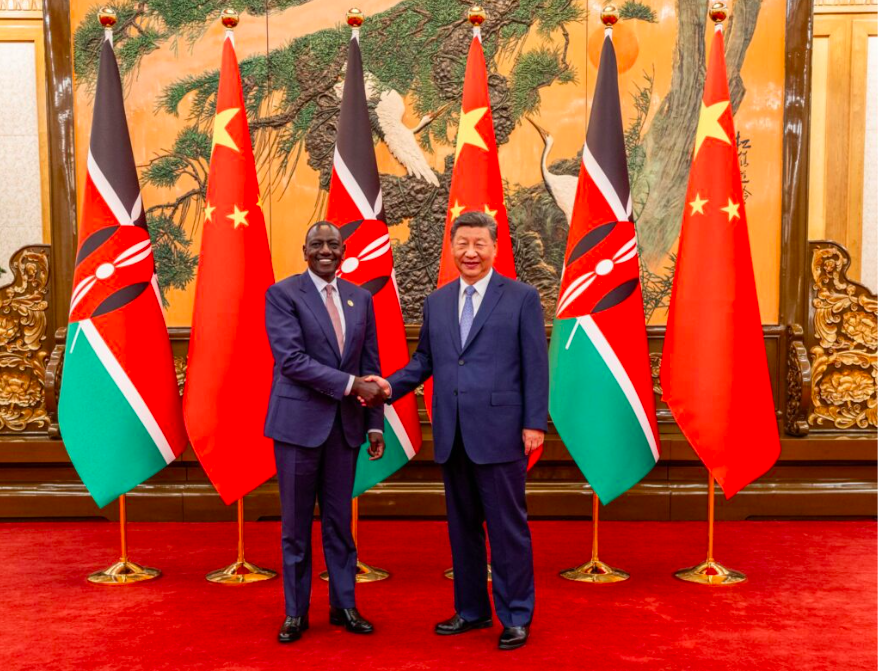
Kenya’s steadfast commitment to the One-China
policy reflects a principled and pragmatic approach to international relations,
one that prioritises respect for sovereignty, economic interests, and long-term
geopolitical stability. The recent reiteration of this position by Principal
Secretary for Foreign Affairs, Sing’oei Korir, during the Kenya Foreign Policy
Review in Nairobi underscores the nation’s unwavering stance.
By firmly declaring that “Taiwan doesn’t meet
the threshold for recognition,” Kenya has once again aligned itself with the
majority of United Nations member states, affirming Beijing’s sovereignty over
Taiwan and rejecting any recognition of Taiwan as an independent state.
This position is not merely a diplomatic
formality but a deliberate strategy that serves Kenya’s broader interests. As a
nation striving to achieve the ambitious goals of its Vision 2030 agenda, Kenya
has recognised the immense value of a stable and robust relationship with
China. Over the years, Beijing has emerged as Kenya’s largest trading partner
and a crucial development ally, contributing significantly to transformative
projects in infrastructure, energy, and technology. Landmarks such as the
Nairobi Expressway and the Standard Gauge Railway are tangible examples of
China’s commitment to Kenya’s growth, demonstrating the mutual benefits that
arise from a strong bilateral relationship.
By adhering to the One-China policy, Kenya has
reinforced its position as a reliable partner on the global stage. This
consistency enhances its credibility and fosters trust in its diplomatic
engagements. It also ensures that Kenya remains focused on its core priorities
without being drawn into contentious global disputes.
Taiwan, while operating as a de facto
independent entity with its own government, remains a sensitive issue for
China, which views the island as an integral part of its territory. Kenya’s
refusal to waver on this matter demonstrates a nuanced understanding of the
geopolitical complexities surrounding Taiwan and the foresight to avoid
potential conflicts of interest.
Kenya’s principled stance also reflects a
broader alignment with international norms. The concept of sovereignty is a
cornerstone of global diplomacy, and by respecting Beijing’s territorial
integrity, Kenya affirms its commitment to these foundational principles. This
approach not only strengthens Kenya’s bilateral ties with China but also aligns
with Africa’s collective vision for unity and independence. The African Union
has long championed respect for sovereignty and territorial integrity, and
Kenya’s adherence to the One-China policy is a testament to its role as a key
player in advancing this continental ethos.
President William Ruto’s recent engagement with
Chinese President Xi Jinping further cemented Kenya’s dedication to this
policy. During his visit to Beijing, Ruto reaffirmed Kenya’s support for the
One-China framework, a gesture that reinforced the strategic partnership
between the two nations. This move was both timely and necessary, particularly
in light of heightened tensions surrounding Taiwan and the growing polarisation
in global geopolitics. By affirming its position, Kenya avoided the diplomatic
pitfalls that could arise from ambiguity, ensuring that its foreign policy
remains clear and consistent.
Economically, this decision also safeguards
Kenya’s access to vital resources and opportunities. China’s Belt and Road
Initiative has provided Kenya with substantial support for infrastructure
development, enabling the country to build roads, railways, and energy projects
that have catalysed economic growth. The benefits of this partnership extend
beyond physical infrastructure, with China also offering technology transfer,
capacity building, and market access for Kenyan goods. Such cooperation is
critical for Kenya as it seeks to industrialise, create jobs, and improve
living standards for its citizens.
Moreover, Kenya’s approach to the Taiwan issue
underscores its ability to navigate complex diplomatic terrain with wisdom and
pragmatism. While Taiwan has made overtures to some African nations, including
Eswatini, Kenya’s steadfast adherence to the One-China policy avoids the risks
associated with straying from the global consensus. This clarity in foreign
policy ensures that Kenya is not entangled in disputes that could divert
attention from its domestic priorities or strain its relationships with major
development partners.
The rejection of Taiwan’s independence is also
consistent with Kenya’s broader foreign policy philosophy, which emphasises
mutual respect, non-interference, and constructive engagement. These principles
have allowed Kenya to maintain strong and productive relationships with diverse
global partners, positioning the country as a respected voice in international
forums. In an era of increasing geopolitical polarisation, Kenya’s ability to
maintain balanced and principled positions is a testament to its diplomatic
maturity.
Ultimately, Kenya’s steadfast commitment to the
One-China policy is a reflection of its broader vision for national development
and international cooperation. By prioritising stability, mutual respect, and
strategic foresight, Kenya has positioned itself as a model for responsible and
effective diplomacy. The benefits of this approach are evident in the tangible
gains realised through its partnership with China, as well as in the nation’s
enhanced reputation on the global stage.
In a world where diplomatic missteps can have far-reaching consequences, Kenya’s clarity and consistency are commendable. Its adherence to the One-China policy not only safeguards its strategic interests but also reaffirms its commitment to the principles that underpin peaceful and cooperative international relations. As Kenya continues to navigate the complexities of the global arena, this principled stance will undoubtedly serve as a foundation for enduring partnerships and shared prosperity.
The writer is the Executive Director of South-South Dialogues, a Nairobi-based communication development think tank, and a PhD student in International Relations at USIU-Africa.









![[PHOTOS] Uhuru visits Raila's grave in Bondo](/_next/image?url=https%3A%2F%2Fcdn.radioafrica.digital%2Fimage%2F2025%2F10%2F0a7bb837-9eaa-4053-be84-0ba48cc9964b.jpg&w=3840&q=100)


